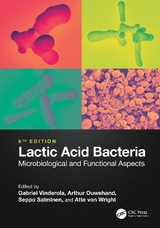
Lactic Acid Bacteria
Crc Press Inc (Verlag)
978-0-8153-6648-5 (ISBN)
- Titel erscheint in neuer Auflage
- Artikel merken
Through four editions, Lactic Acid Bacteria: Microbiological and Functional Aspects, has provided readers with information on the how’s and why’s lactic acid-producing fermentation improves the storability, palatability, and nutritive value of perishable foods. Thoroughly updated and fully revised, with 12 new chapters, the Fifth Edition covers regulatory aspects globally, new findings on health effects, properties and stability of LAB as well as production of target specific LAB. The new edition also addresses the technological use of LAB in various fermentations of food, feed and beverage, and their safety considerations. It features the detailed description of the main genera of LAB as well as such novel bacteria as fructophilic LAB and novel probiotics and discusses such new targets as cognitive function, metabolic health, respiratory health and probiotics.
Key Features:
In 12 new chapters, findings are presented on health effects, properties and stability of LAB as well as production of target specific LAB
Covers such novel bacteria as fructophilic LAB and novel probiotics
Presents new discoveries related to the mechanisms of lactic acid bacterial metabolism and function
Covers the benefits of LAB, both in fermentation of dairy, cereal, meat, vegetable and silage, and their health benefits on humans and animals
Discusses the less-known role of LAB as food spoilers
Covers the global regulatory framework related to safety and efficacy
Gabriel Vinderola is Associate Professor at the Food Engineering Department of the Faculty of Chemical Engineering (National University of Litoral) and Independent Researcher of the National Scientific and Technical Research Council (CONICET) at the Industrial Dairy Institute (INLAIN) in Santa Fe (Argentina), and has been a visiting professor (2004) at Moncton´s University (Canada). He is the author of over 90 journal articles and book chapters in the field of probiotic lactic acid bacteria and bifidobacteria. Dr. Vinderola received his degree (1997) and Ph.D. degree in chemistry from the National University of Litoral (Santa Fe, Argentina). He participated in the development of the first commercial probiotic cheese in Latin America (1999) and he was awarded (2011) as young researcher in Food Technology by the Argentinian National Academy of Exact, Physical and Natural Sciences. Dr. Arthur Ouwehand is Technical Fellow and research manager at DuPont Nutrition & Health in Kantvik, Finland. He has a research background in both academia and industry. His main interest is on functional foods, in particular, probiotics and prebiotics and their influence on the intestinal microbiota. He is active in the International Life Sciences Institute Europe, the International Dairy Federation, the International Probiotics Association and the International Scientific Association for Probiotics and Prebiotics. Dr. Ouwehand received his M.S. degree (1992) in cell biology from Wageningen University (the Netherlands) and his Ph.D. degree (1996) in microbiology from Göteborg University (Sweden). In 1999, he was appointed as an Adjunct Professor in Applied Microbiology at the University of Turku (Finland), and he is the author of more than 250 journal articles and book chapters. Seppo Salminen is a Professor and the Director of Functional Foods Forum at the University of Turku, Finland, and has been a visiting professor at the RMIT University, Melbourne, Australia, and Universität für Bodenkultur, Vienna, Austria. He is the author of over 400 journal articles and book chapters, and the editor or coeditor of several books. He has served in NDA Panel (evaluation of eg novel foods and health claims) and several working groups of the European Food Safety Authority and other international committees including ILSI Europe and International Dairy Federation. Professor Salminen received his M.S. degree (1978) in food science from Washington State University, Pullman, his M.Sc. degree (1979) in food chemistry and technology from the University of Helsinki, Finland, and his Ph.D. degree (1982) in biochemistry and toxicology from the University of Surrey, UK. He is a member of the Finnish Academy of Science and Letters and the president elect of the International Scientific Association of Probiotics and Prebiotics (ISAPP). Atte von Wright is the Emeritus Professor of Food Biotechnology at the University of Eastern Finland. He graduated in 1975 from the University of Helsinki, majoring in General Microbiology, obtained his Licentiate of Philosophy degree from the same University in 1978, and his PhD degree from the University of Sussex, UK. His research interest include food toxicology and hygiene, molecular biology of lactic acid bacteria, probiotics and prebiotics and natural bioactive compounds. Besides his University career he has worked as a research group leader in Valio Finnish Coopersative dairies' Association and in the Technical Research Centre of Finland. His previous international duties include working as an expert in the panels of The European Food Safety Authority dealing with the safety aspects of feed additives and genetically modified organisms.
Contents
Preface...............................................................................................................................................ix
Editors ...............................................................................................................................................xi
Contributors ................................................................................................................................... xiii
Chapter 1 Lactic Acid Bacteria: An Introduction .......................................................................1
Atte von Wright and Lars Axelsson
Chapter 2 Genetics of Lactic Acid Bacteria .............................................................................. 17
Lorenzo Morelli and Atte von Wright
Chapter 3 Genus Lactococcus ................................................................................................... 33
Atte von Wright
Chapter 4 The Genus Lactobacillus .......................................................................................... 47
Fandi Ibrahim and Arthur C. Ouwehand
Chapter 5 Fructophilic Lactic Acid Bacteria: An Overview of Their Unique Properties ........ 57
Akihito Endo
Chapter 6 Introduction to the Genera Pediococcus, Leuconostoc, Weissella, and
Carnobacterium........................................................................................................65
Elina Säde and Johanna Björkroth
Chapter 7 Streptococcus: A Brief Update on the Current Taxonomic Status of the Genus ......87
John R. Tagg, Philip A. Wescombe, John D. F. Hale, and Jeremy P. Burton
Chapter 8 Probiotic Enterococci, Their Enterocins and Their Use in Animals ...................... 109
Andrea Lauková
Chapter 9 Bifidobacteria: General Overview of Ecology, Taxonomy, and Genomics ............ 125
Chiara Ferrario, Francesca Turroni, Douwe van Sinderen,
and Marco Ventura
Chapter 10 Bacteriophage and Anti-phage Mechanisms in Lactic Acid Bacteria .................... 139
Jennifer Mahony, Susan Mills, R. Paul Ross, Horst Neve, Aidan Coffey,
and Douwe van Sinderen
Chapter 11 Antimicrobials from Lactic Acid Bacteria and Their Potential Applications ........ 151
Fergus W. J. Collins, Mary C. Rea, Colin Hill, and R. Paul Ross
Chapter 12 Lactic Acid Bacteria for Fermented Dairy Products .............................................. 175
Sylvie Binda and Arthur C. Ouwehand
Chapter 13 Lactic Acid Bacteria in Cereal-Based Products ....................................................... 199
Michael G. Gänzle and Hannu Salovaara
Chapter 14 Lactic Acid Bacteria in Meat Fermentations: Role of Autochthonous Starter
Cultures on Quality, Safety and Health .................................................................. 215
Graciela Vignolo, Patricia Castellano, Cecilia Fontana, Pier Sandro
Cocconcelli, and Silvina Fadda
Chapter 15 Examples of Lactic-Fermented Foods of the African Continent ........................... 235
Charles M. A. P. Franz and Wilhelm H. Holzapfel
Chapter 16 Lactic Acid Bacteria in Vegetable Fermentations .................................................. 255
Kun-Young Park and Boh Kyung Kim
Chapter 17 Lactic Acid Bacteria and Silage Fermentation ....................................................... 275
Ibukun M. Ogunade, Oscar C. M. Queiroz, and Kathy G. Arriola
Chapter 18 Lactic Acid Bacteria (LAB) in Grape Fermentations: An Example of LAB as
Contaminants in Food Processing ..........................................................................287
Eveline Bartowsky
Chapter 19 Lactic Acid Bacteria in Food Spoilage ...................................................................303
Vasileios Pothakos and Johanna Björkroth
Chapter 20 The Production of Lactic Acid Bacteria Starters and Probiotic Cultures:
An Industrial Perspective ....................................................................................... 317
Gabriel Vinderola, Claude P. Champagne, and Émilie Desfossés-Foucault
Chapter 21 Stability of Lactic Acid Bacteria and Bifidobacteria in Foods and
Supplements ........................................................................................................... 337
Miguel Gueimonde, Clara G. de los Reyes-Gavilán, Borja Sánchez,
Nuria Salazar, and Silvia Arboleya
Chapter 22 The Safety of Lactic Acid Bacteria for Use in Foods ............................................. 355
David Obis, Myriam Paris, and Arthur C. Ouwehand
Chapter 23 Safety of Novel Bacteria for Probiotic Use: European Perspective ........................ 371
Theodor Brodmann, Seppo Salminen, Wolfgang Kneifel, Gabriel Vinderola,
and Carlos Gómez-Gallego
Chapter 24 Lactic Acid Bacteria in the Gut .............................................................................. 383
Mirjana Rajilić-Stojanović, Suzana Dimitrijević, and Nataša Golić
Chapter 25 Gastrointestinal Benefits of Probiotics: Clinical Evidence .....................................409
Arthur C. Ouwehand
Chapter 26 Probiotics and the Immune System ........................................................................ 423
Hanne Frøkiær
Chapter 27 Targeting the Gut Microbiota in Metabolic Disorders and Juvenile Growth:
Potential Impact of Lactic Acid Bacteria and Next Generation Probiotics ............ 441
Kassem Makki, Martin Schwarzer, Bernardo Cuffaro, Hubert Vidal,
Emmanuelle Maguin, and Corinne Grangette
Chapter 28 Brain–Gut–Microbiota Axis in Mood and Cognition: Impact
of Psychobiotics .....................................................................................................463
Mary I. Butler, John F. Cryan, and Timothy G. Dinan
Chapter 29 Lactic Acid Bacteria and Oral Health ....................................................................485
Iva Stamatova, Qingru Jiang, and Jukka H. Meurman
Chapter 30 Human Studies on Probiotics and Endogenous Lactic Acid Bacteria in the
Female Urogenital Tract ......................................................................................... 495
Gregor Reid
Chapter 31 Lactic Acid Bacteria and Respiratory Health: Their Beneficial Effects on
Viral Infections .......................................................................................................505
Julio Villena, Alexander Suvorov, Haruki Kitazawa, and Susana Alvarez
Chapter 32 Human Studies on Probiotics: Infants and Children .............................................. 521
Hania Szajewska
Chapter 33 Nutrition Economics: Confirming Benefits of Probiotics and Prebiotics ............... 533
Aki Koponen and Seppo Salminen
Chapter 34 Beneficial Microbes for Companion Animals ........................................................ 541
Minna Rinkinen and Shea Beasley
Chapter 35 Lactic Acid Bacteria in Aquatic Environments and Their Applications ................ 555
Beatriz Gómez-Sala, Javier Feito Hermida, Pablo E. Hernández Cruza,
and Luis M. Cintas Izarra
Chapter 36 The Use of Probiotics in Nutrition and Disease Prevention in Farm Animals ...... 579
Alojz Bomba, Radomíra Nemcová, Ladislav Strojný,
and Dagmar Mudronˇová
Chapter 37 Probiotic Effects of Non-viable Lactic Acid Bacteria ............................................609
Marion Bernardeau and Marina Cretenet
Chapter 38 Probiotics Regulation in Asian and Australasian Countries .................................. 631
Cyndy Au, Sandy Lin, Wei Shao, Su Jin, Yan Wen, Jasvir Singh,
Victor Basuki, Hiroko Tanaka, Geun Eog Ji, E-Siong Tee, Julie D. Tan,
Ming-Ju Chen, Malee Jirawongsy, Le Hoang Vinh, Caroline Gray,
and Yuan-Kun Lee
Chapter 39 Probiotics Regulation in Latin American Countries .............................................. 683
Ana Binetti, Patricia Burns, Daniela Tomei, Jorge Reinheimer,
and Gabriel Vinderola
Chapter 40 The Regulation of Probiotics in the United States .................................................693
Amy B. Smith
Chapter 41 Regulation of Probiotics in Canada ........................................................................ 711
Jon-Paul Powers
Chapter 42 Safety Assessment of Probiotics in the European Union (EU) .............................. 723
Atte von Wright
Index .............................................................................................................................................. 735
| Erscheinungsdatum | 15.04.2019 |
|---|---|
| Zusatzinfo | 63 Tables, black and white; 60 Illustrations, black and white |
| Verlagsort | Bosa Roca |
| Sprache | englisch |
| Maße | 178 x 254 mm |
| Gewicht | 1560 g |
| Themenwelt | Naturwissenschaften ► Biologie ► Mikrobiologie / Immunologie |
| Technik ► Lebensmitteltechnologie | |
| ISBN-10 | 0-8153-6648-5 / 0815366485 |
| ISBN-13 | 978-0-8153-6648-5 / 9780815366485 |
| Zustand | Neuware |
| Informationen gemäß Produktsicherheitsverordnung (GPSR) | |
| Haben Sie eine Frage zum Produkt? |
aus dem Bereich



